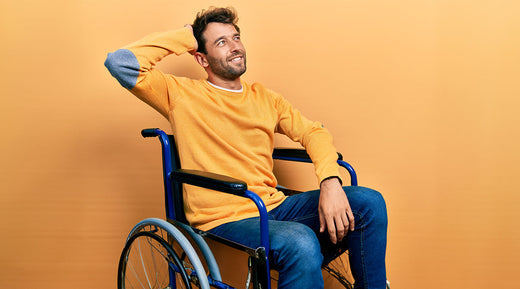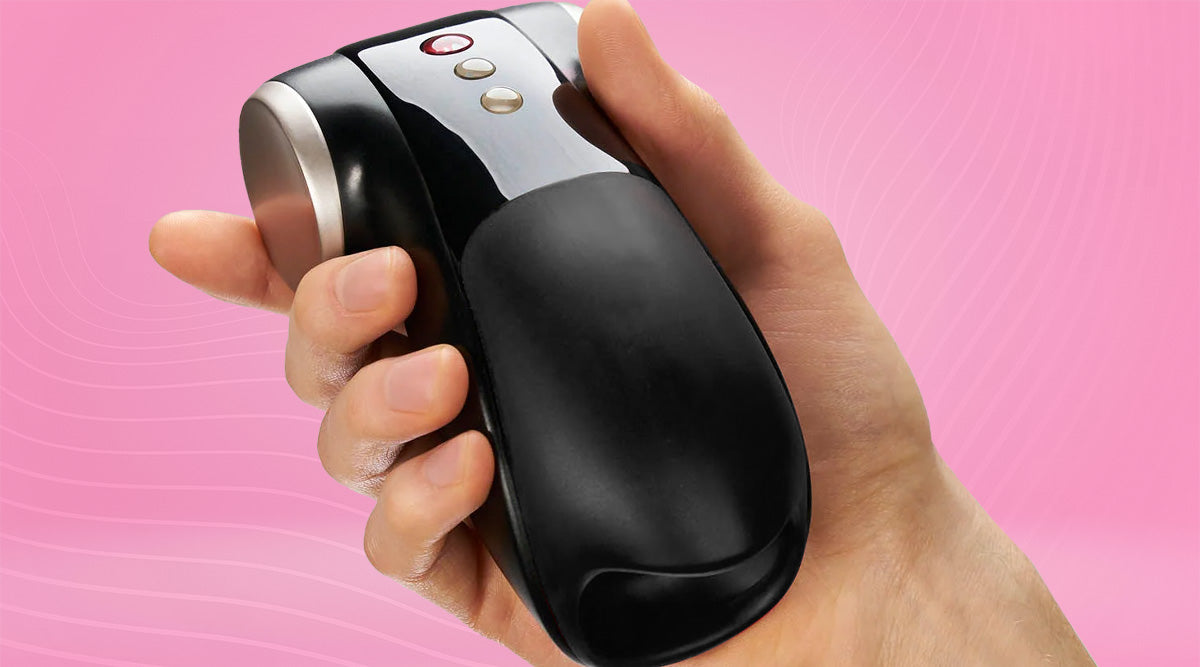How It Works Mobile
Health Benefits Mobile

Can Quadriplegic Men Have Sex?
Can Quadriplegic Men Have Sex?
5 min read
5 min read
Table of Contents
- Who is a Quadriplegic with a Spinal Cord Injury?
- Can Quadriplegic Men Have Sexual Pleasure?
- Physical Adaptations and Aids for Sexual Stimulation
- Can Quadriplegic Men Have Children?
- Sperm Retrieval Techniques and Fertility Options
- Safety Considerations for Quadriplegic Sex and Erectile Dysfunction
- Conclusion: How to Have a Sex Life with Spinal Cord Injuries
Spinal cord injuries often bring profound changes to many areas of life, including intimacy. For men with quadriplegia, including those with complete spinal cord injury, the journey toward rediscovering sexuality and physical connection, including sexual encounters, may seem daunting, but it’s far from impossible.
While quadriplegia brings challenges, men with these injuries can still build fulfilling intimate relationships. With the right tools and guidance, quadriplegic men and their partners can discover new ways to connect and enjoy meaningful relationships.
Who is a Quadriplegic with a Spinal Cord Injury?
A quadriplegic is someone who has experienced a spinal cord injury or neurological condition that results in partial or complete paralysis of all four limbs. This type of injury often affects areas higher on the spinal cord, typically at or above the cervical region (C1-C7), which controls movement and sensation in the arms, hands, torso, and legs.
Quadriplegia impacts not only physical mobility but can also affect various bodily functions, including sensation, muscle control, and, in some cases, breathing. Additionally, erectile dysfunction is a common issue that can arise due to the disruption of nerve pathways.
Quadriplegia can vary greatly in severity. Some individuals retain limited movement or sensation in certain areas, while others may have little or no control over their limbs and require assistive devices or support for daily activities.
Can Quadriplegic Men Have Sexual Pleasure?
Quadriplegic men often face pressing questions about intimacy and sexual function after experiencing a spinal cord injury. This includes concerns about the ability to engage in sexual intercourse and how it will be affected by their injury. Understandably, there can be a mix of concerns and curiosity around how a high-level spinal injury will impact intimate relationships and physical connections.
The truth is, while spinal cord injuries may disrupt some physical processes, quadriplegic men can still engage in fulfilling sexual relationships with the right support, adaptive techniques, and a comprehensive understanding of human sexuality. Understanding the changes in sexual arousal and how to adapt to them is crucial for maintaining intimacy. Advances in medical devices, assistive tools, and an improved understanding of spinal cord injuries have made it possible to maintain a satisfying sex life that is both physically and emotionally rewarding.
A spinal cord injury interrupts the nervous system’s pathways that control sexual response, which can affect arousal, sensation, erection, and ejaculation. For quadriplegic men, these challenges may be more complex due to the injury’s high location on the spine. Despite this, physical and emotional intimacy remains achievable, thanks to medical and technological advances tailored to these unique needs.
Physical Adaptations and Aids for Sexual Stimulation

To support sexual activity, quadriplegic men can benefit from physical adaptations and therapies designed specifically for individuals with spinal cord injuries. Penile vibratory stimulation therapy is among the most effective methods, facilitating arousal and supporting the ability to achieve and maintain an erection. This therapy uses specialized medical vibrators to stimulate penile nerves, often aiding men with limited or absent sensation.
Devices like the Viberect by Reflexonic play a vital role in penile vibratory stimulation therapy. Viberect is designed to activate the dorsal and ventral nerves of the penis through controlled vibrations, triggering reflex erections. This response originates from direct physical stimulation rather than mental arousal. Clinically studied, Viberect has shown effectiveness in promoting the physical response needed for arousal, providing valuable support for men who may otherwise struggle with erectile function due to nerve damage.
Penile vibratory stimulation therapy allows men with spinal cord injuries to experience intimacy by enabling an erection through consistent, controlled stimulation. Even when sensation is limited, devices like Viberect can bridge the gap, offering quadriplegic men a powerful tool to reconnect with their partners physically and emotionally.
Can Quadriplegic Men Have Children?
For quadriplegic men interested in fatherhood, spinal cord injuries may pose some hurdles but don’t eliminate the possibility of maintaining male fertility. While achieving ejaculation may be more complex due to nerve damage, advancements in reproductive medicine offer multiple avenues for men with quadriplegia to become biological fathers. Techniques such as sperm retrieval allow men to bypass the traditional ejaculatory process, providing a viable solution for conception.
Sperm Retrieval Techniques and Fertility Options

Sperm retrieval is a medical procedure used to collect sperm directly from the testicles or epididymis. This approach can be particularly beneficial for men with quadriplegia who may have difficulty ejaculating. Sperm retrieval techniques vary based on the specific needs and health of the individual and can include methods like testicular sperm extraction (TESE) or percutaneous epididymal sperm aspiration (PESA). In these procedures, a medical professional collects sperm that can later be used in fertility treatments. These techniques address the specific challenges posed by sexual dysfunction due to spinal cord injuries.
Once retrieved, sperm can be used in assisted reproductive technologies, such as in-vitro fertilization (IVF) or intrauterine insemination (IUI), to enable conception. Working with a fertility specialist can provide quadriplegic men and their partners with tailored guidance, allowing them to explore these options in a way that aligns with their family-building goals.
Safety Considerations for Quadriplegic Sex and Erectile Dysfunction

Engaging in sexual activity with a spinal cord injury requires specific safety considerations to ensure a positive and risk-free experience. Quadriplegic men, particularly those with injuries above the T6 level, are at risk of autonomic dysreflexia—a condition unique to spinal cord injuries that can lead to sudden and severe blood pressure increases during times of stress or sensory overload, including sexual activity. Sexual counseling can also play a crucial role in addressing these safety concerns and enhancing overall well-being. Here are some key safety tips:
Manage Autonomic Dysreflexia
Autonomic dysreflexia is a potentially life-threatening condition that causes blood pressure to spike dangerously in response to stimuli below the level of spinal injury. Symptoms can include severe headaches, sweating, flushing, and blurred vision. If symptoms appear during sexual activity, it is crucial to stop immediately and take steps to lower blood pressure. Techniques for managing autonomic dysreflexia vary, and consulting a healthcare professional is recommended to develop an individualized plan for preventing and responding to episodes during intimacy.
Consider Skin Sensitivity and Pressure Management
Due to reduced sensation and mobility, quadriplegic men may be at a higher risk of skin breakdown and pressure sores, especially during physical activity. It’s essential to monitor skin areas for any signs of redness, bruising, or irritation after intimacy, as these can develop into pressure sores if unnoticed. Cushions, supportive devices, and frequent repositioning can help reduce pressure on sensitive areas, and regular skin checks can further prevent complications. Consulting a healthcare provider for safe positioning techniques and preventive care is advised to ensure comfort and avoid skin-related issues.
Conclusion: How to Have a Sex Life with Spinal Cord Injuries

Quadriplegic men can lead fulfilling, intimate lives. With medical support, adaptive devices, and open communication, many challenges associated with spinal cord injuries can be addressed. Men with quadriplegia can experience intimacy that provides both physical satisfaction and emotional closeness, deepening the bond with their partners. Additionally, reproductive options make fatherhood attainable for men with quadriplegia, allowing them to fulfill their dreams of becoming fathers if they choose.
While spinal cord injuries introduce unique considerations, quadriplegic men can embrace meaningful physical connection, intimacy, and a fulfilling sexual relationship. By seeking personalized medical advice, exploring adaptive devices, and fostering open communication, quadriplegic men and their partners can build intimate and fulfilling relationships that celebrate connection in all its forms.
RELATED ARTICLES

Sexual Function for Men After Spinal Cord Injury
10 min read

How to Use a Vibrator on Your Penis
8 min read

What is Penile Vibratory Stimulation?
8 min read
Recent Articles
- 12 Types of Female Orgasms: How to Help Her Experience Each One
- Why I Recommend You Get a Tantric Couch
- The Downsides of Penis Enlargement Surgery: Risks and Alternatives
- Bathmate vs. Air Pumps
- Bathmate Results: Penis Pump Before & After
- Side Effects of Catuaba
- Health Benefits of Catuaba
- 12 Essential Tips for a Healthy Penis
- Can Quadriplegic Men Have Sex?
- Sexual Function for Men After Spinal Cord Injury






























